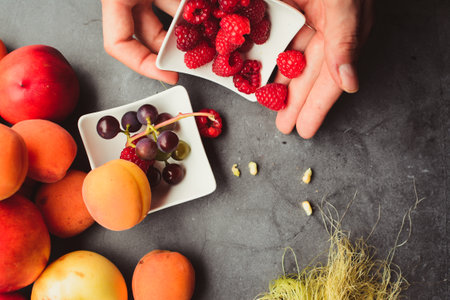Introduction: Tuning in With the Rhythm of Nature
In the heart of the British Isles, the turning of the seasons is more than just a change in weather—it is an ancient rhythm that has shaped our food traditions, health, and well-being for centuries. Today, as we face a fast-paced world filled with convenience foods and global imports, there is a growing movement among health-conscious Britons to rediscover the wisdom of eating seasonally. This approach draws from both the teachings of traditional medicine and modern nutritional science, highlighting how nature’s cycles can guide us toward balance on our plates and within our bodies. By tuning into what grows locally through each season, we not only honour the land but also nurture ourselves in harmony with the environment. Embracing seasonal eating is not simply a nod to nostalgia; it is a powerful practice, rooted in both ancient and contemporary understanding, that supports vibrant health and a deeper connection to nature’s ever-changing dance.
2. The Cycles of British Seasons and Their Local Bounty
The United Kingdom’s landscape is painted with four distinct seasons, each bringing its own climate, energy, and agricultural gifts. In the philosophy of traditional medicine, we believe that nature’s rhythm guides not only what thrives in our fields but also what best nourishes our bodies at any given time. By tuning into these seasonal cycles, we can gently harmonise body and mind with the world around us.
Spring: Renewal and Lightness
As the chill of winter melts away, spring breathes new life into the countryside. This season favours foods that are fresh, green, and cleansing—mirroring the body’s need to awaken from winter’s heaviness. British fields offer tender greens like wild garlic, watercress, asparagus, and early rhubarb. These ingredients support the liver and encourage gentle detoxification, preparing us for increased activity.
Key Spring Produce
| Vegetables & Fruits | Energy & Benefit |
|---|---|
| Asparagus, Watercress, Spinach | Cleansing; encourages upward energy |
| Rhubarb | Stimulates digestion; refreshes the palate |
Summer: Abundance and Vitality
The longer days and warmer temperatures usher in an abundance of colourful fruits and vegetables. Summer is a time for cooling foods that hydrate and support circulation, helping balance the heart’s fire energy in traditional medicine terms. Local strawberries, broad beans, peas, cucumbers, and tomatoes are plentiful. Light salads and juicy berries help keep the body cool and energetic.
Key Summer Produce
| Vegetables & Fruits | Energy & Benefit |
|---|---|
| Strawberries, Raspberries, Blackcurrants | Hydrating; supports heart health |
| Cucumbers, Peas, Broad Beans | Cools and moistens; eases digestion |
Autumn: Grounding and Nourishment
With cooler winds and shorter days comes a harvest rich in root vegetables and fruits that fortify the system against coming chills. Traditional wisdom encourages warming foods such as carrots, parsnips, apples, pears, squashes, and mushrooms. These strengthen the digestive system (or “Spleen Qi”) while grounding the spirit as nature slows down.
Key Autumn Produce
| Vegetables & Fruits | Energy & Benefit |
|---|---|
| Pumpkin, Squash, Parsnip | Nourishing; builds core strength |
| Apples, Pears, Plums | Mildly warming; supports immunity |
Winter: Restorative Warmth and Protection
The coldest months call for hearty dishes that warm from within. Foods that store well—such as cabbages, leeks, potatoes, swedes—feature heavily in British winter cooking. In Chinese medicine thinking, this is a time to protect “Kidney Qi” by enjoying slow-cooked stews and broths that restore warmth and resilience.
Key Winter Produce
| Vegetables & Fruits | Energy & Benefit |
|---|---|
| Cabbage, Leek, Swede, Potato | Deeply warming; preserves vitality |
| Kale, Brussel Sprouts | Sustains energy; supports resistance to cold |
A Harmonious Cycle Throughout the Year
This gentle journey through Britain’s seasons reveals how local produce naturally aligns with our shifting needs—from awakening in spring to nourishing in autumn. By eating with nature’s flow and honouring these cycles on our plates, we nurture both physical wellness and inner harmony year-round.

3. Spring Renewal: Embracing Greens and Freshness
As winter’s chill recedes, the British landscape awakens with a vibrant tapestry of green. This seasonal shift is reflected in our plates, where spring vegetables offer both nourishment and renewal. In traditional Chinese medicine, spring is associated with the liver—the organ linked to cleansing and growth. It is an ideal time to embrace foods that support gentle detoxification and revitalise the body after the stillness of winter.
The Power of Spring Greens
Amongst the first signs of spring are wild garlic, asparagus, and watercress. Wild garlic carpets ancient woodlands across the UK, its fragrant leaves signalling nature’s call to awaken. Asparagus, celebrated by British growers from Kent to Yorkshire, offers tender spears rich in vitamins and minerals. Watercress flourishes in cool streams, bringing peppery freshness and a bounty of antioxidants to early spring salads.
A Time for Cleansing and Rejuvenation
Spring greens possess natural cleansing properties, gently supporting liver function and encouraging the release of stagnant energy accumulated over winter. These foods are light yet deeply nourishing—helping us shed heaviness, both physically and emotionally, as days lengthen. Incorporating these ingredients into daily meals aligns with the cyclical wisdom of nature, promoting clarity and vitality.
Honouring Tradition in Modern Life
Whether enjoyed in a simple wild garlic pesto stirred through new potatoes or a crisp watercress salad alongside grilled fish, embracing spring’s produce is a practice rooted in both tradition and wellbeing. By tuning into what grows locally at this time of year, we harmonise our inner landscape with the rhythms of the land—a true celebration of renewal on the British table.
Summer Vitality: Nourishing With Sun-Kissed Flavours
As summer graces the UK, nature gifts us with an abundance of vibrant fruits and vegetables. This season is a celebration of vitality, and, from a holistic perspective, aligns with the height of yang energy – warmth, activity, and growth. In the ancient wisdom of traditional medicine, summer is the time to nourish our hearts and spirits, harmonising our inner fire by choosing foods that are both cooling and energising.
Berries: Nature’s Jewels for Body and Mind
British fields and hedgerows overflow with strawberries, raspberries, blackberries, and currants during summer. These sun-ripened berries are not only bursting with flavour but also rich in antioxidants and vitamin C. From a mind-body perspective, they help clear internal heat while uplifting our mood. Enjoying them fresh or gently stewed preserves their vital essence and supports emotional balance amid summer’s busy pace.
Table: Key Summer Fruits & Their Benefits
| Fruit | Traditional Benefit | Nutritional Highlight |
|---|---|---|
| Strawberries | Cools heat; nourishes fluids | Vitamin C, fibre |
| Raspberries | Moves stagnation; lifts spirit | Antioxidants, manganese |
| Blackcurrants | Tonic for vitality | Vitamin C, anthocyanins |
Tomatoes and Peas: The Heart of British Summer Meals
The UK’s gardens brim with tomatoes and peas in summer. Tomatoes, juicy and cooling, support heart health—central to both Western nutrition and Eastern philosophy as the seat of joy in this season. Peas add a sweet crunch, nourishing qi (vital energy) while being light on digestion. These vegetables can be enjoyed in salads, lightly steamed or tossed into seasonal dishes, allowing their natural flavours to shine.
Simple Ways to Harness Summer’s Energy
- Create colourful salads: Mix berries with leafy greens for a refreshing side.
- Savour lightly cooked veg: Quick steaming maintains nutrients and keeps dishes easy to digest.
- Enjoy outdoor meals: Eating al fresco connects us to nature’s rhythm, enhancing seasonal harmony.
Nourishing Body and Spirit Through Abundance
This season invites us to celebrate life’s fullness—eating locally grown produce at its peak not only supports our health but also uplifts our spirits. By embracing summer’s sun-kissed offerings, we nourish both body and mind in tune with nature’s generous flow.
5. Autumn Transition: Supporting Balance and Immunity
As the British landscape transforms with golden leaves and cooler breezes, autumn invites us to embrace grounding foods that nurture both body and mind. In traditional Chinese medicine, this season marks a time to support balance and fortify our immune system, preparing for winters challenges. The art of grounding becomes essential as we adjust to shorter days and fluctuating temperatures.
Root vegetables such as carrots, parsnips, swedes, and beetroot flourish in the UK during autumn. These earthy treasures are energetically warming and provide sustained nourishment, helping us stay rooted as nature withdraws its energy underground. Their natural sweetness supports digestive health and gently uplifts our mood—an important consideration as daylight wanes.
British apples come into their own now, offering crisp refreshment and a wealth of antioxidants. Their tart-sweet flavour is not only a symbol of the season but also harmonises the bodys internal balance, supporting lung health—a key focus in both local tradition and Chinese medicine for autumn wellness.
Brassicas such as kale, cabbage, and Brussels sprouts also reach their peak. These sturdy greens bolster immunity with vitamin C and fibre, while their slightly bitter notes help clear lingering summer heat from the body. Including them regularly supports the bodys natural defences and keeps the mind clear as we transition into the slower rhythms of autumn.
By aligning our plates with these locally grown foods, we honour the wisdom of nature and foster harmony within ourselves. This mindful approach to eating not only strengthens our immunity but also encourages emotional stability, reminding us that true wellness flows from seasonal attunement.
6. Winter Warming: Rooted in Comfort and Preservation
As the UK landscape transforms under winter’s chill, our dietary needs also shift. In traditional English culture, this season has long been associated with nourishing stews, roasted root vegetables, and preserved foods—each dish reflecting both necessity and wisdom. In Chinese medicine, winter is a time to support the kidneys and conserve internal warmth, aligning with the British instinct to seek comfort through hearty meals.
Rediscovering Traditional English Dishes
Winter invites us to revisit classics such as root vegetable stew, parsnip soup, and colcannon—a creamy blend of potatoes and cabbage. These dishes not only draw upon what is naturally abundant but also provide the deep nourishment needed to sustain us through long nights. Embracing these recipes connects us to generations past, echoing the harmony between body, season, and local land.
Preservation: A Seasonal Necessity
Before refrigeration, Britons relied on age-old techniques like pickling, fermenting, and cellaring to extend the bounty of autumn into winter. Preserved brassicas—such as sauerkraut or pickled red cabbage—not only enliven winter plates but also aid digestion. Fermented foods are revered in both Western folk tradition and Chinese medicine for supporting gut health and overall vitality during colder months.
The Healing Power of Winter Squashes and Brassicas
Winter squashes—like butternut, acorn, and pumpkin—are staples that store well and provide gentle sweetness that nourishes the Spleen according to Chinese theory. Brassicas including kale, Brussels sprouts, and savoy cabbage thrive in frost-kissed fields, their robust nature imparting resilience to our own bodies. Their warming qualities help counteract the external cold while fortifying digestive harmony from within.
Cultivating Warmth for Digestive Harmony
From a holistic perspective, winter eating in the UK should centre on cooked foods served warm—think bubbling casseroles or slow-roasted roots—rather than raw salads or chilled dishes. Spices such as ginger or black pepper can be added for extra warmth. This approach supports not just physical digestion but emotional comfort too, mirroring nature’s invitation to slow down, nourish deeply, and preserve energy until spring returns.
7. Living Seasonally: Mindful Habits for Everyday Harmony
Embracing seasonal eating in the UK is more than a culinary choice—it’s a mindful way to nurture your body, connect with nature, and strengthen local communities. To truly live seasonally means weaving ancient wisdom into daily habits, harmonising your plate with the rhythms of the British countryside and your own inner wellbeing.
Practical Ways to Eat with the Seasons
Start by shopping at farmers’ markets or joining a local veg box scheme. These options offer fresher produce, reduce food miles, and support regional growers. Get acquainted with what’s naturally abundant each month—think tender asparagus in spring, vibrant berries in summer, earthy root vegetables in autumn, and hearty brassicas through winter. Let these ingredients inspire your weekly meals and try new recipes that celebrate their unique flavours and qualities.
Cultivating Mindful Eating Rituals
Incorporate simple mindful practices: savour the colours, aromas, and textures on your plate. Pause before eating to express gratitude for the journey from field to fork. Following the Chinese medicine principle of “eating with the climate,” choose warming stews in chilly months and lighter salads when days are long and bright—helping your body adapt gently to environmental changes.
Nourishing Community and Environment
Seasonal eating is a communal act. Invite friends or neighbours for shared meals celebrating local harvests, or join community allotments to grow your own produce. Reducing reliance on imported foods lessens your carbon footprint, strengthening both ecological balance and community resilience—a form of collective self-care.
Self-Care Through Seasonal Awareness
Honour your personal needs alongside nature’s cycles. Notice how certain foods affect your energy and mood as seasons shift. Prioritise rest during darker months and gentle movement outdoors when light returns. This attunement fosters harmony between body, mind, and environment—the heart of living seasonally in Britain.
Your Seasonal Journey Forward
By integrating these mindful habits into everyday life, you not only nourish yourself but also play an active role in sustaining the land and culture around you. Let nature guide your plate—and discover a deeper sense of balance rooted in the timeless dance of the British seasons.


